Hungary can stop Ukrainian accession later, Orbán says
Speaking on Hungarian state radio this morning, Hungary’s prime minister, Viktor Orbán, said he tried for hours to convince European leaders not to sign off on launching accession negotiations with Kyiv.
Orbán said the leaders had several arguments he had to take into account:
-
“They are 26, and I’m alone.”
-
“They want to give Ukraine through this decision the encouragement needed to continue the war, and they asked that I don’t obstruct them in this.”
-
“But their decisive argument was that Hungary doesn’t lose anything with this … If we don’t want Ukraine to be a member of the European Union, then the Hungarian parliament votes it down. And until the issue gets to the parliaments, it’s a very, very long process, and as they counted and I did, there are about 75 occasions when the Hungarian government can stop this process. And they said that if during the negotiations there is something which hurts Hungary’s interests, I stop it.”
Orbán also reiterated that Hungary did not want to take part in the “bad decision” and that is why he left the room while leaders made the decision to open accession talks.
“Later we can stop this process, if needed we pull the handbrake,” he said.
Key events
EU position on Gaza moving, says Varadkar
Lisa O’Carroll
European leaders are unlikely to call for a ceasefire in the conflict in the Middle East but may harden the language of the declaration the European Council made in October when it called for pauses or pauses in the bombing of Gaza, said the Irish prime minister, Leo Varadkar.
Foreign policy matters are done on the basis of consensus or unanimity. The majority of EU countries are now calling for a ceasefire, that’s very clear from the UN vote the other day, but there are one or two who are not because they believe that it would prevent Israel from pursuing Hamas terrorists.
I don’t agree with that interpretation. You can pursue terrorists without engaging in the kind of war and destruction that Israel is engaging in at the moment.
He added:
I am not sure we can get agreement on the use of the word ceasefire. But I do think we’ll see the European Union’s position move on considerably from where it was in October. We now have a clear majority of countries here in the European Union calling for a ceasefire.
He also said there was also likely to be “strong language on human rights” and violence by some Israeli settlers West Bank.
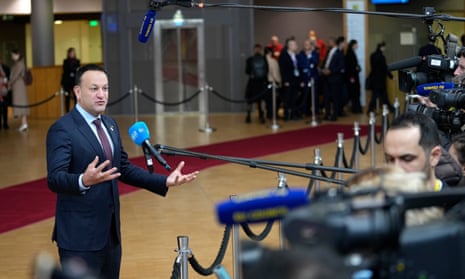

Lisa O’Carroll
EU leaders are expected to issue fresh statements on the Middle East, the rise of antisemitism and the question of sanctions against Israeli settlers involved in violence in the West Bank this afternoon.
First on the agenda is the Middle East.
Diplomats said it was “important that leaders were allowed to speak” on the issue but, unlike the last summit meeting in October, they were not looking to make a common declaration, thereby averting a repeat of five-hour debate on whether there should be “pause” or “pauses” in the bombing of Gaza.
To follow on the agenda are discussions about security and defence, migration and the strategic priorities for the EU, including the improving relations with Turkey.
After a long night, leaders are meeting again.
Here are some photos.
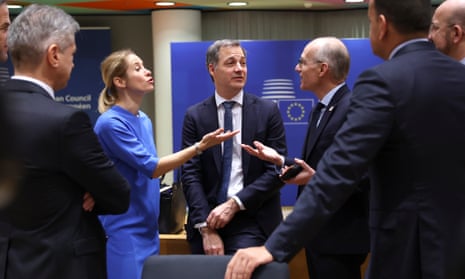
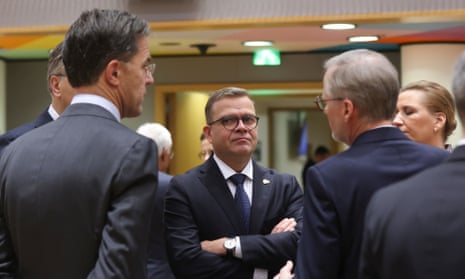

Kosovo reiterates candidacy push as Ukraine and Moldova move ahead
Albin Kurti, Kosovo’s prime minister, called the EU’s decision to open accession talks with Ukraine and Moldova a “historic moment” – but also used the opportunity to underscore that enlargement to the western Balkans “is the best way to bolster peace & security across the continent”.
As one of the most democratic & pro-EU states in the region, Kosovo should be granted candidate status w/o delay.
A historic moment as @EUCouncil voted to open accession talks w/ 🇺🇦 & 🇦🇩. 🇪🇺 enlargement—incl. the WB6—is the best way to bolster peace & security across the continent. As one of the most democratic & pro-EU states in the region, 🇽🇰 should be granted candidate status w/o delay.
— Albin Kurti (@albinkurti) December 15, 2023
The EU leaders were not the only ones to have a late work night.
Latvia’s prime minister, Evika Siliņa, gave a shoutout to the interpreters who were up with the heads of state and government until 3am.
Eiropas līderu sanāksmē atkal esam šodien atpakaļ, pēc vakardienas vēsturiskā lēmuma par Ukrainu un Moldovu.🇪🇺🇺🇦🇲🇩
Vakar te beidzām darbu 3:00 naktī, tikmēr mūsu tulki veica lielisku darbu, tulkojot no spāņu, franču, poļu un daudzām citām ES valodām mūsu līderu diskusijas. #EUCO pic.twitter.com/B0kvhaeXB5— Evika Siliņa 🇱🇻🇺🇦 (@EvikaSilina) December 15, 2023
The centre-right European People’s party has expressed concern about the outcome of last night’s budget discussion among EU leaders.
“Technological innovation is one of the key areas of European excellence – cutting important research funding to the benefit of other programmes is not acceptable, as it threatens Europe’s future wellbeing and competitiveness,” said the German MEP Christian Ehler.
He added:
We will continue to fight for our budget until there is an agreement that lives up to these promises.
Gitanas Nausėda, Lithuania’s president, said this morning: “Today we are celebrating.”
“I am proud to be European, and it was necessary to send this political signal to our friends, in Ukraine especially.”
Belgian leader calls for common position on Middle East
Arriving at the summit, where leaders today will discuss the situation in the Middle East, the Belgian prime minister, Alexander De Croo, said:
I think compared to the last council the situation has worsened in a dramatic way. What should be our objective is that the human suffering should end, on both sides – and there has been way too much human suffering.
What are the components of that, is full humanitarian access needs to happen, hostages need to be liberated, and there needs to be a cease of the hostilities.
Now, how do we get there? An important element is that we Europeans have a common position. If we want to have a serious role in that conflict. And I think we have to, because we would be bearing the consequences if things go further in a bad direction.
He added: “The killing of innocent civilians really needs to stop.”
‘Strong will’ to provide funds to Ukraine, Estonian PM says
Arriving at day two of the summit, Estonia’s Kaja Kallas said: “Yesterday we made a historic decision.”
She added:
As you know, I wasn’t very optimistic. But we managed to do the decision. And we are happy about this.
What of course we have to work with is the financial support.
What I can assure you that Ukraine will not be left without support. There was a strong will of 26 to provide this support, and there were different ways how we can do this.
So will work this out. Probably we’ll have another meeting, maybe in January, to reach agreement on this.
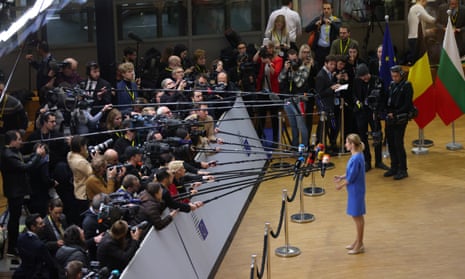
Hungary can stop Ukrainian accession later, Orbán says
Speaking on Hungarian state radio this morning, Hungary’s prime minister, Viktor Orbán, said he tried for hours to convince European leaders not to sign off on launching accession negotiations with Kyiv.
Orbán said the leaders had several arguments he had to take into account:
-
“They are 26, and I’m alone.”
-
“They want to give Ukraine through this decision the encouragement needed to continue the war, and they asked that I don’t obstruct them in this.”
-
“But their decisive argument was that Hungary doesn’t lose anything with this … If we don’t want Ukraine to be a member of the European Union, then the Hungarian parliament votes it down. And until the issue gets to the parliaments, it’s a very, very long process, and as they counted and I did, there are about 75 occasions when the Hungarian government can stop this process. And they said that if during the negotiations there is something which hurts Hungary’s interests, I stop it.”
Orbán also reiterated that Hungary did not want to take part in the “bad decision” and that is why he left the room while leaders made the decision to open accession talks.
“Later we can stop this process, if needed we pull the handbrake,” he said.
26 out of 27 leaders agreed on funding, Michel says
Speaking to reporters overnight, after many hours of discussion among the bloc’s 27 leaders, European Council president said “26 leaders agreed” on the budget proposal on the table.
“One leader, Sweden, needs to consult its parliament, which is in line with the usual procedure for this country – and one leader couldn’t agree,” he said, in a veiled reference to Hungary’s Viktor Orbán.
The budget revision includes a proposed 50 bn euro package for Ukraine, and spending on migration, defence and other priorities.
Michel added:
It means that we will revert to this matter early next year and we will try to get unanimity.
But, he stressed, “tonight we spent a very powerful signal to the European citizens, a very powerful signal to the Ukrainian citizens.”
Earlier in the evening, European leaders agreed to open accession talks with Ukraine and Moldova, with Orbán leaving the room while the decision was made.
“This is a historic moment, a historic European Council,” Michel said.
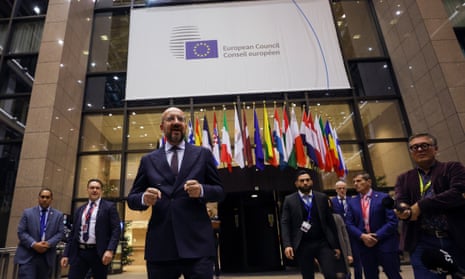
Hungary blocks €50bn package for Ukraine
After hours of talks, at 2.38am local time Hungary’s prime minister, Viktor Orbán, said he had blocked agreement on both a new funding package for Ukraine and a top-up of the EU’s multiyear budget.
But he did not say he would veto forever, noting that the leaders would return to the issue next year “after proper preparation”.
Summary of the nightshift:
🚫 veto for the extra money to Ukraine,
🚫 veto for the MFF review.
We will come back to the issue next year in the #EUCO after proper preparation.— Orbán Viktor (@PM_ViktorOrban) December 15, 2023
Welcome to the blog
Good morning and welcome to another edition of our European summit blog.
Send tips and comments to [email protected].

